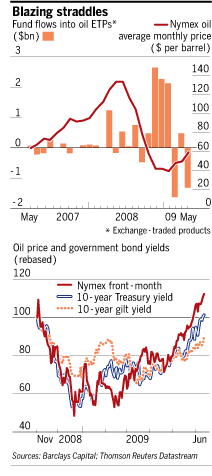Oil price rally
Roula Khalaf, Editor of the FT, selects her favourite stories in this weekly newsletter.
The commodity vigilantes rode out first. They spotted recovery on the horizon back in mid-December. Pumped up with cheap money, they have been raising dust ever since. The oil price has almost doubled to $72 a barrel this year.
Bond vigilantes joined their posse a bit later. If oil is rising, they figured, inflation will follow close behind. Quantitative easing was their spur as they saddled up.
Now both groups are on market patrol, trampling green shoots back into the dust. Every $1 rise in the oil price costs consumers globally $30bn more a year.
UK 10-year gilts, meanwhile, hit a seven-month high on Monday of more than 4 per cent, and US Treasuries sold for 3.99 per cent, their highest since August. Further rises would lynch the recovery.
Then, as market strategist Ed Yardeni puts it, the vigilantes could ride home and do what they like best: buy bonds again.

It is possible the vigilantes have got overexcited. Most policymakers believe hopes of global recovery are premature. Yet not all the oil price rally can be explained by speculative flows. Even the International Energy Agency believes some of it is due to growing demand. Asia, perhaps, is the reason. After all, last year, for the first time, the developing world consumed more energy than the developed world.
Chinese exports may still be falling but freight rates are rising. That supports the notion global activity could be normalising – although not what a vigilante believes normal should be.
BP’s chief executive has a view. He thinks oil prices should be between $60 and $90; high enough to spur investment, low enough to sustain demand. Opec would probably agree.
Take the midpoint, and oil prices could level out soon. Then there are bonds. Over the long term, real yields have averaged about 3 per cent.
As markets are currently pricing in 10-year US inflation of 2 per cent, that would imply bond yields of 5 per cent – a full point higher than they are now. A weak recovery could prove the bond vigilantes wrong. But such sums suggest they are not done yet.
To e-mail the Lex team confidentially
click here
OR
To post public comments
click here
The Lex column is now on Twitter. To receive our daily line-up and links to Lex notes via Twitter, click here
_________________________________________
Lex is the FT’s agenda-setting column, giving an authoritative view on corporate and financial matters. It is also one of the few parts of FT.com available only to Premium subscribers. This article is provided for free as an example. A Premium subscription gives you unlimited access to all FT content, including all Lex articles and the FT mobile Newsreader.
If you have questions or comments, please e-mail help@ft.com or call:
US and Canada: +1 800 628 8088
Asia: +852 2905 5555
UK, Europe and rest of the world: +44 (0)20 7775 6248
Comments